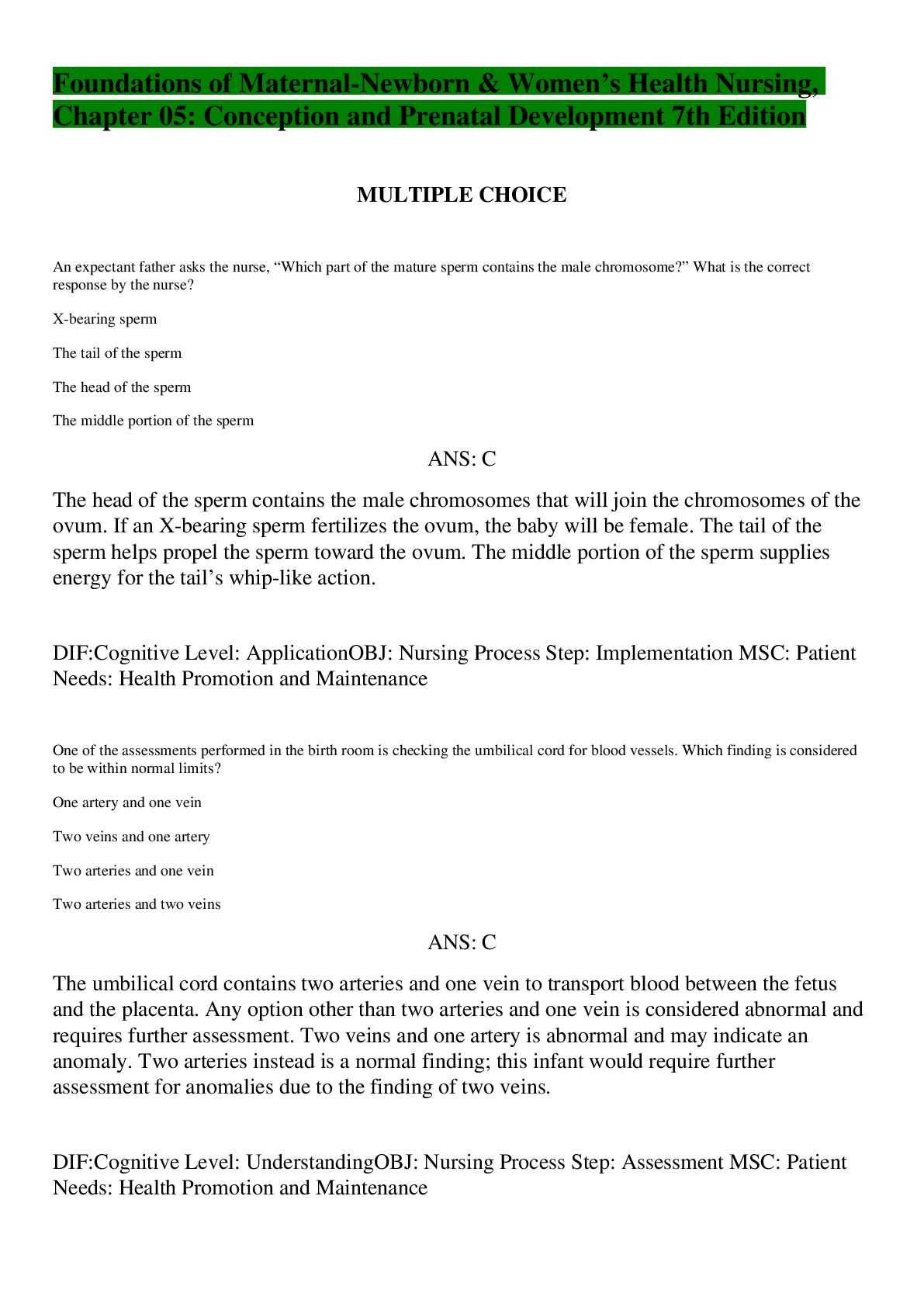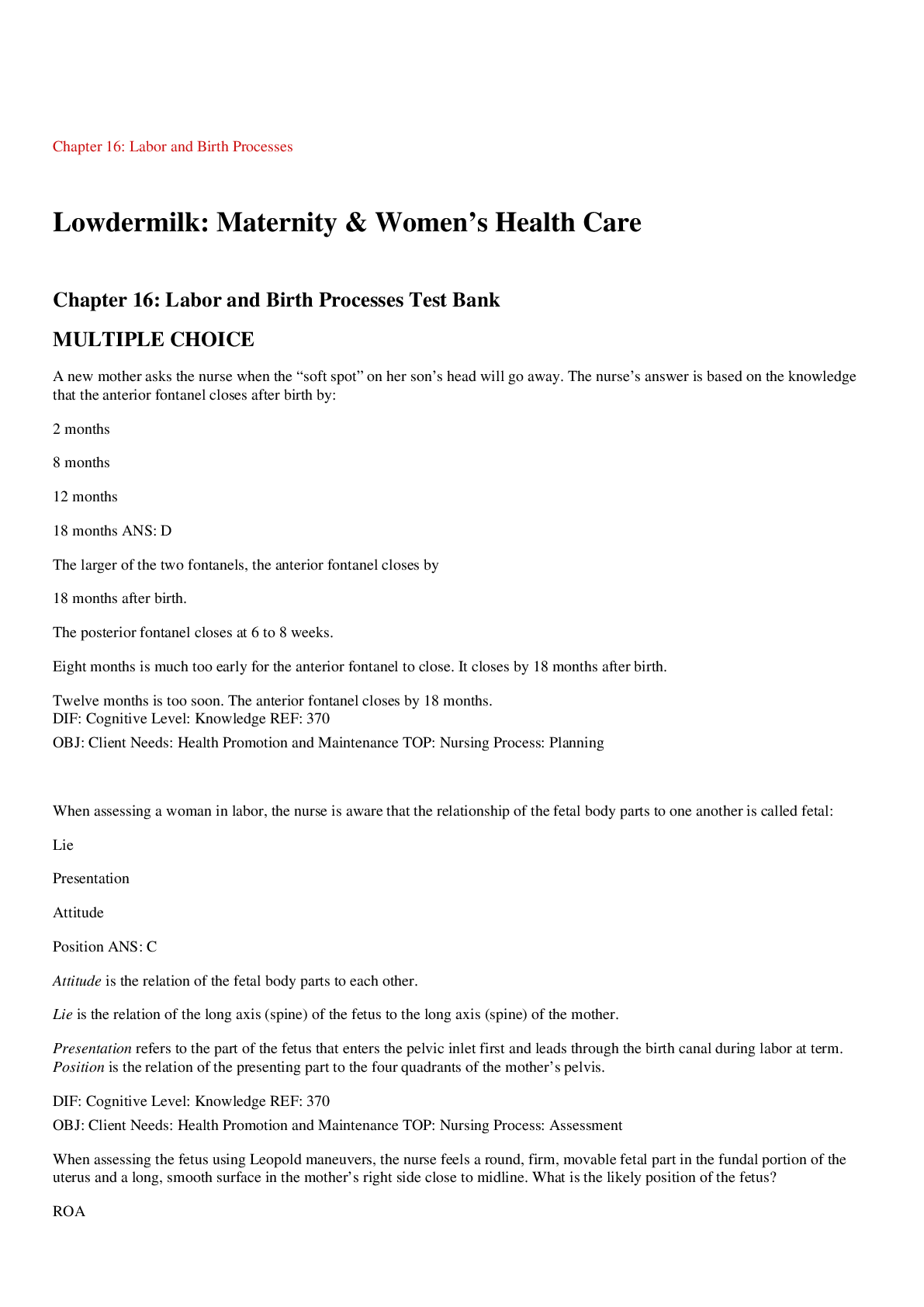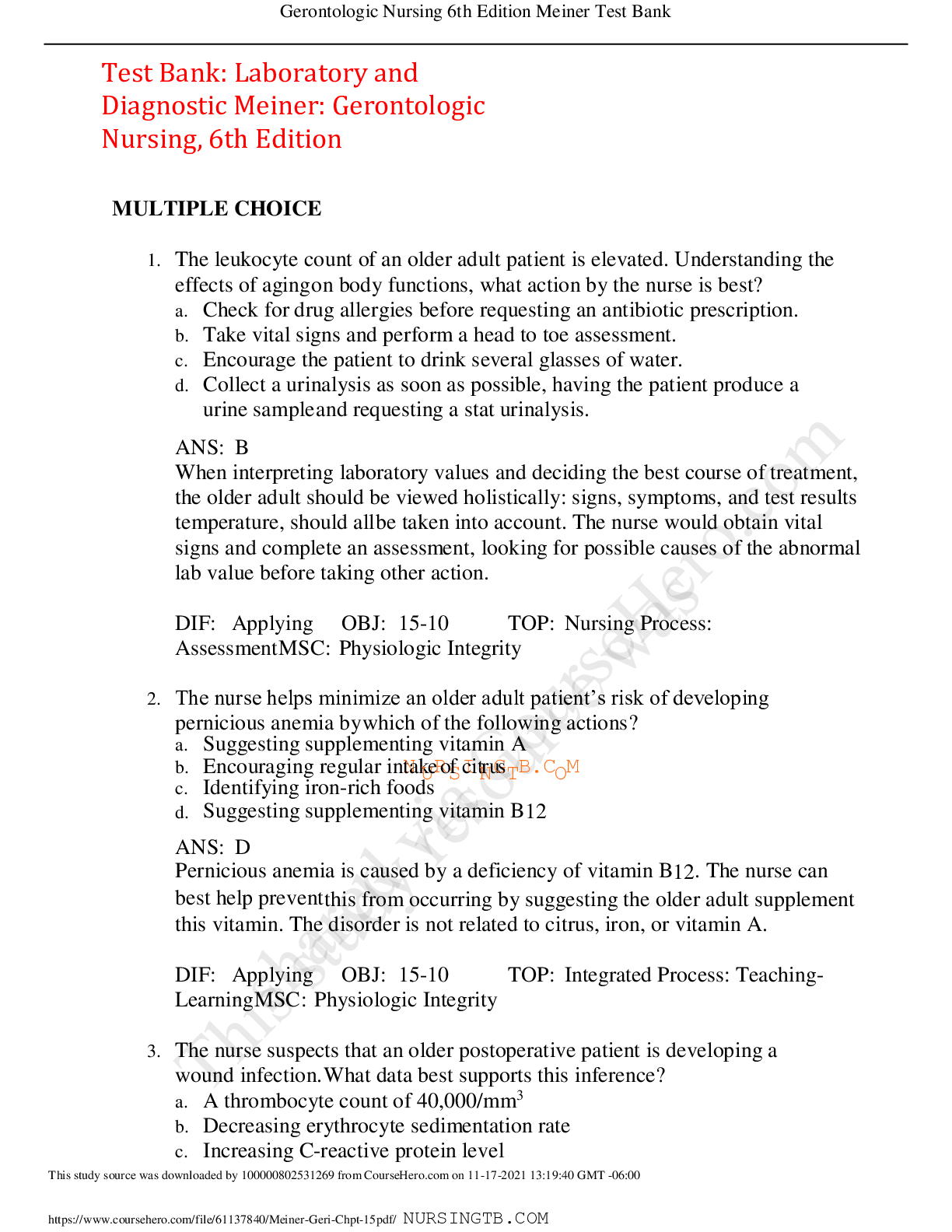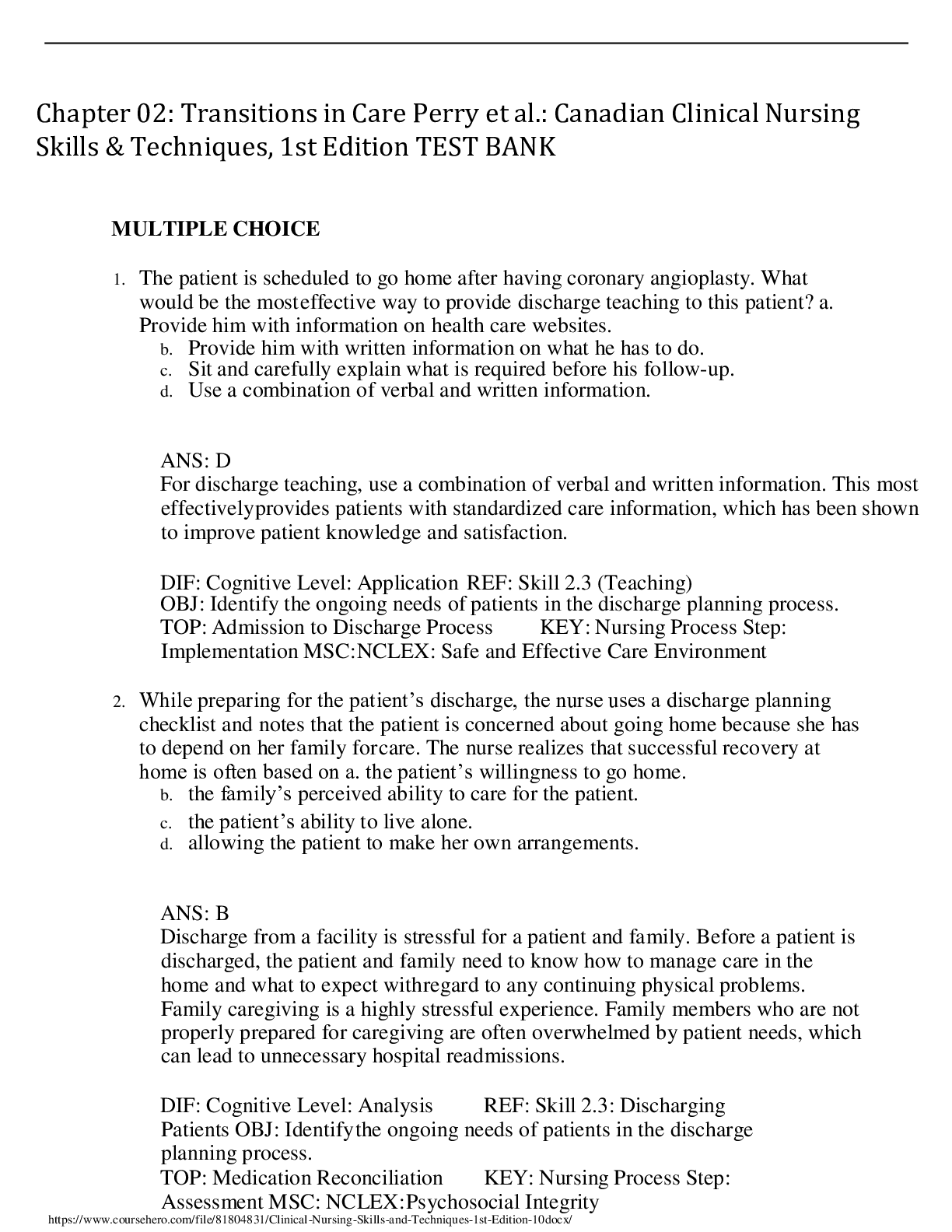*NURSING > TEST BANK > Test Bank: Therapeutic Environment in Various Treatment Settings Keltner: Psychiatric Nursing, 8th (All)
Test Bank: Therapeutic Environment in Various Treatment Settings Keltner: Psychiatric Nursing, 8th Edition,100% CORRECT
Document Content and Description Below
Test Bank: Therapeutic Environment in Various Treatment Settings Keltner: Psychiatric Nursing, 8th Edition MULTIPLE CHOICE 1. A nurse working in an intensive inpatient psychiatric unit should... place emphasis on which area of care? a. Behavior modification principles b. Personality restructuring and insight c. Improving interpersonal relationships d. Symptom stabilization and daily living skills ANS: D The nurse will emphasize symptom stabilization and daily living skills, because the length of stay will be short. Behavior modification principles are not used in all settings. Developing insight, restructuring personality, and improving interpersonal relationships are lengthy endeavors. DIF: Cognitive level: Applying TOP: Nursing process: Planning MSC: Client Needs: Physiologic Integrity 2. What is the primary purpose of a community meeting? a. Making assignments for patients’ chores for the day b. Determining patients’ eligibility for increases in privileges c. Encouraging patients to share their feelings and individual problems d. Providing a forum for patNientRs toIhavGe inBp.utCintoMdaily program operations ANS: D U S N T O An emphasis of community meetings is on democratic aspects of unit life. The meeting serves as a forum for patients to voice opinions about the environment and to initiate discussion of community concerns. Making assignments and sharing are only some of the issues addressed in a community meeting. Privilege eligibility would not be discussed in a community meeting. DIF: Cognitive level: Analyzing TOP: Nursing process: Implementation MSC: Client Needs: Safe, Effective Care Environment 3. A patient asks, “Who will be at the community meeting?” How should the nurse responds? a. “Patient representatives and staff” b. “Members of the mental health team” c. “All patients and the nurse manager” d. “All patients, nursing staff, and students” ANS: D Typically, all patients, students assigned to the unit, and all nursing staff attend community meetings. Members of other disciplines might or might not attend. DIF: Cognitive level: Understanding TOP: Nursing process: Implementation MSC: Client Needs: Safe, Effective Care Environment 4. During the community meeting a patient says, “I’m having problems in my sex life.” The leader of the meeting should make which response to support effective patient care? a. “Go on. We are here to listen.” b. “That’s a topic to discuss with your therapist today.” c. “How does everyone else feel about discussing this topic?” d. “Perhaps you should leave the meeting until you are in better control.” ANS: B Individual problems are not dealt with in community meetings. It is suggested to patients that individual issues be discussed with one’s therapist. The focus of community meetings is on matters of general concern to the group at large. When the patient is informed of when and where to address the individual problem, it should be done in a nonpunitive manner. DIF: Cognitive level: Applying TOP: Nursing process: Implementation MSC: Client Needs: Psychosocial Integrity 5. What is the priority treatment goal for a patient with severe and persistent mental illness being treated in a community-based facility? a. Formation of new relationships b. Ability to self-administer medications c. Interest in participating in community activities d. Ability to attend to activities of daily living ANS: D Priority outcomes for community treatment focus on the individual being able to function at his or her optimal level by attending to activities of daily living. The other options have a lower priority or can be managed by others. DIF: Cognitive level: Analyzing TOP: Nursing process: Planning MSC: Client Needs: PsychosocNiaUl IRntSegIriNtyGTB.COM 6. What is the best way to support the need for physical activity when the patient moves from acute care into community-based care? a. Use video-based exercise programs on television. b. Enroll in a swim class at the community center. c. Attend outpatient psychoeducational groups. d. Join a social club. ANS: B The key combination affords the patient physical exercise as well as opportunities for social interaction at a community center. Exercise on television is solitary. Psychoeducational and social interaction do not achieve the goal. DIF: Cognitive level: Analyzing TOP: Nursing process: Planning MSC: Client Needs: Health Promotion and Maintenance 7. Which diagnosis meets criteria for admission to a co-occurring inpatient unit? a. Bipolar disorder, manic phase, patient has abused alcohol daily to self-medicate b. Undifferentiated schizophrenia and hallucinations of angels playing harps c. Major depression, suicidal intent, and a highly lethal suicide plan d. Anorexia nervosa and 30% underweight ANS: A The patient experiencing a bipolar episode and abusing alcohol would meet criteria for such a diagnosis unit, since its focus is on the treatment of substance abuse and mental illness in a psychiatric hospital setting. The other three patients require acute psychiatric care but do not meet the admitting criteria. DIF: Cognitive level: Analyzing TOP: Nursing process: Assessment MSC: Client Needs: Psychosocial Integrity 8. Which therapeutic intervention should the nurse suggest for a patient with panic attacks and problems with concentration? a. Occupational therapy b. Medication education c. Recreational therapy d. Group therapy ANS: A Occupational therapists prescribe activities that can help the patient increase concentration and focus. The other activities are not designed to increase concentration and attention span. DIF: Cognitive level: Analyzing TOP: Nursing process: Planning MSC: Client Needs: Psychosocial Integrity 9. A patient diagnosed with depression has a need for divisional activities. Which team member is best qualified to assess the patient’s leisure needs and plan the interventions? a. Occupational therapist b. Recreational therapist c. Exercise physiologist d. Chaplain ANS: B NURSINGTB.COM Recreational therapists are qualified to assist patients to find leisure interests that will enable the patient to learn to balance work and play. The other professionals do not have this focus. DIF: Cognitive level: Understanding TOP: Nursing process: Planning MSC: Client Needs: Psychosocial Integrity 10. Which patient would benefit most from closed, process-oriented group therapy? a. Adult with disorganized schizophrenia admitted to an acute psychiatric unit b. Outpatient living independently with chronic low self-esteem and anxiety c. Patient receiving treatment in an assertive community treatment program d. Resident of a group home attending a partial hospitalization program ANS: B Group therapy is seldom an option during short-term treatment. The individual with low self-esteem, anxiety, and living independently meets criteria for being able to develop plans for change and coping, and is able to attend group sessions long enough to benefit from group therapy’s curative features. A patient in an assertive community program is someone who receives care from a team that seeks him or her out in the community. Group home residents might or might not be suitable for inclusion in group therapy sessions. DIF: Cognitive level: Analyzing TOP: Nursing process: Planning MSC: Client Needs: Psychosocial Integrity 11. A patient says, “I’m like a wind-tossed leaf. My goal is to find meaning in life.” The nurse should consider referring the patient to which group? a. Self-help b. Spirituality c. Reality orientation d. Psychoeducational ANS: B Lack of meaning in one’s life is a spiritual concern. Referral to a spirituality group has potential for helping the client. The other options do not address the patient’s expressed concern. DIF: Cognitive level: Applying TOP: Nursing process: Planning MSC: Client Needs: Psychosocial Integrity 12. An adolescent has an autism spectrum disorder. Which psychoeducational group topic would best meet the patient’s needs? a. Signs of relapse b. Interpersonal skills c. Anger management d. Medication management ANS: B Individuals with autism spectrum disorders almost universally have impaired relationships and need help learning effective social skills to support relationships. Anger and medication management might or might not be needs of such individuals. Deficits are constant, so relapse is not an issue. NURSINGTB.COM DIF: Cognitive level: Applying TOP: Nursing process: Implementation MSC: Client Needs: Psychosocial Integrity 13. A nurse works in a geropsychiatric unit. Which intervention will be most helpful for patients experiencing confusion and disorientation? a. Door locks b. Environmental cues c. Community meetings d. Psychoeducational groups ANS: B Environmental cues can be helpful to patients with cognitive impairment, such as signs with names or graphic images, orientation boards, and color-coding locations. These elements are usually present on dementia units and geropsychiatric units. Community meetings and psychoeducational groups may be helpful but may also overstimulate patients with dementia. Door locks help the staff rather than patients. DIF: Cognitive level: Applying TOP: Nursing process: Implementation MSC: Client Needs: Psychosocial Integrity 14. A large mental health facility has several specialized units. A patient admitted for alcohol withdrawal asks, “Will I be with patients who have schizophrenia or dementia while I’m here?” Select the nurse’s best answer. a. “No. Patients with alcoholism often become violent and must be isolated from our general psychiatric population.” b. “No. Patients with needs for alcohol detoxification are treated on our acute substance abuse unit.” c. “Yes. Our patients often help each other, so they are all on the same unit.” d. “Your question leads me to wonder if you’re feeling frightened.” ANS: B Specialty units serve specific populations of patients. The patient in need of alcohol detoxification will receive care on an acute substance abuse unit. It’s important to answer the patient’s question. Afterward, the nurse can explore the patient’s feelings. Violence is a risk during alcohol withdrawal, but the risk alone is not a reason to isolate the patient from others. DIF: Cognitive level: Applying TOP: Nursing process: Implementation MSC: Client Needs: Psychosocial Integrity 15. Which outcome of hospital-based psychiatric care should the nurse consider a priority for a patient to achieve before discharge? a. Referral for vocational rehabilitation b. Safe level of functioning c. Medication stabilization d. Problem resolution ANS: B Safe level of functioning is of paramount importance before a patient returns to the community. Work toward problem resolution and medication stabilization can continue in the community. Referral for aftercare might or might not be necessary, depending on a patient’s needs. NURSINGTB.COM DIF: Cognitive level: Applying TOP: Nursing process: Planning MSC: Client Needs: Psychosocial Integrity 16. Which treatment setting would necessitate the most restrictive environment? a. Partial hospitalization b. Geropsychiatric unit c. Forensic hospital d. Group home ANS: C Patients in forensic hospitals have mental illness as well as conviction or charges for criminal activity. These settings must be therapeutic but also confine patients from society. Rules, regulations, and restrictions have similarities to those of prisons. DIF: Cognitive level: Applying TOP: Nursing process: Planning MSC: Client Needs: Safe, Effective Care Environment 17. A nurse working on a geropsychiatric unit designs new clinical protocols. Which potential problems have the highest priority? a. Risks for falls b. Cognitive errors c. Memory deficits d. Nutritional deficits ANS: A Patients in geropsychiatric units have an especially high risk for falls. Safety is the nurse’s priority concern. DIF: Cognitive level: Analyzing TOP: Nursing process: Planning MSC: Client Needs: Safe, Effective Care Environment NURSINGTB.COM [Show More]
Last updated: 1 year ago
Preview 1 out of 11 pages
Instant download

Buy this document to get the full access instantly
Instant Download Access after purchase
Add to cartInstant download
Reviews( 0 )
Document information
Connected school, study & course
About the document
Uploaded On
Oct 18, 2021
Number of pages
11
Written in
Additional information
This document has been written for:
Uploaded
Oct 18, 2021
Downloads
0
Views
33






















